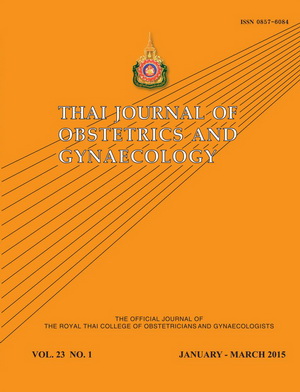Effects of Antenatal Dexamethasone on Respiratory Distress in Late Preterm Infant: A randomized controlled trial
Main Article Content
Abstract
Objective: To determine the effects of antenatal dexamethasone on rate of respiratory distress in late preterm infant comparing with non-dexamethasone.
Materials and Methods: 194 singleton pregnant women who were admitted to Chonburi hospital due to preterm labor pain from August 2012 to March 2014 were randomized by block of four method into two groups. The study group (n=96) was prescribed dexamethasone 6 mg intramuscularly every 12 hours for totally 4 doses or until delivery and control group (n= 98) who not receive dexamethasone. Rate of respiratory distress, neonatal morbidity and mortality were assessed and analysed by Unpaired T test, Mann Whitney U test and Chi-square test between 2 groups with intention to treat basis.
Results: The study showed that respiratory distress was statistically significant lower in study group, 9 cases (9.4%) compared with control group, 20 cases (20.4%). (p-value = 0.03, relative risk = 0.40, confidence interval = 0.17 to 0.94). Anyway, the need for respiratory support and the need of intensive unit care were not different, (p-value = 0.07, 0.05, respectively).
Conclusion: Administration of dexamethasone in late preterm pregnant women with preterm labor significantly decrease the rate of respiratory distress.


